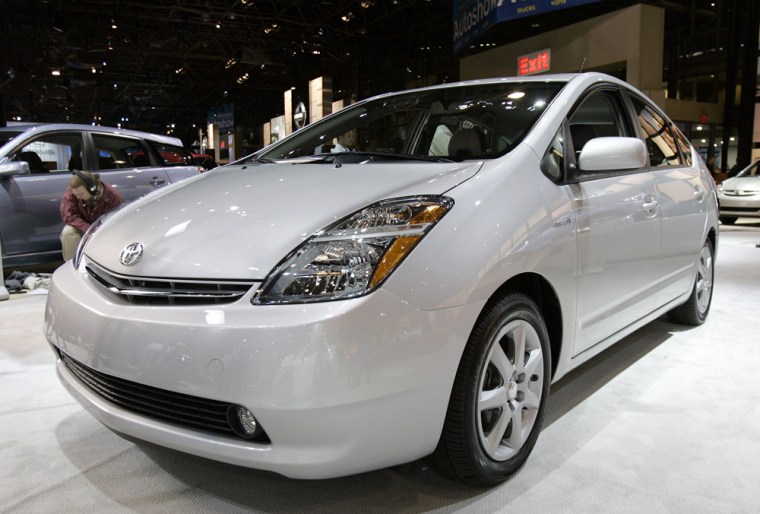Spring is getting a late start in the United States this year, with mid-April snow blanketing parts of the nation. But the month of March still saw a burst of green for Japanese automaker Toyota.
Even as the Big Three automakers saw their sales drop, Toyota’s U.S. sales soared to a record in March, thanks partly to soaring demand for its eco-friendly, hybrid gasoline-electric powered vehicles. Sales of Toyota’s Prius, the best-selling hybrid model, jumped to 19,156, more than double the 7,922 sold a year ago.
Are lots of American car buyers turning “green”? Not necessarily. Part of the reason for Toyota’s sales jump was a series of discounts it has offered on the Prius — a strong favorite among environmentalists that this year celebrates its 10th anniversary of production — in a bid to broaden its appeal to more mainstream car shoppers.
Toyota offered subsidized interest programs to Prius buyers in February and March, but those incentives will shift to cash-back offers in April, ranging from $600 to $2,000, depending on the options package and region of the country.
As the Prius incentive program is pared back, sales may falter. A poll done by CarGurus.com, an automotive community site, found that a majority of the more than 500 respondents, or 80 percent, have no plans to buy a hybrid vehicle as their next car despite rising gas prices and a growing interest in curbing the emission of gases that contribute to global climate change. Hybrids cut emissions and gas use by using an electric motor at slow speeds.
“Taking these results with the results of another survey we did in January, which showed the top two reasons car shoppers have for buying a new cars is better performance and better gas mileage, I think the concern here about hybrids is they don’t deliver on performance,” said Langley Steinert, founder and CEO of CarGurus.com.
Hybrid cars do deliver better gas mileage. The 2007 Toyota Prius gets a combined city and highway gas mileage of 55 miles per gallon, according to the Department of Energy. That is far higher than the 25 mpg average fuel efficiency for other vehicles in the midsize car segment. But the 2007 Prius goes from 0 to 60 mph in a sluggish 10.1 seconds and achieves a top speed of only 105 mph, which could leave many new-car buyers cold, Steinert said.
There may be other road blocks for hybrid sales, which have wobbled since August. These include a decline in gas prices late last year and the fact that Toyota has run up against a federal limit for tax credits that have helped drive sales of the gas-friendly sedan. Another reason is recently revised fuel mileage standards from the Environmental Protection Agency that are designed to more accurately reflect how Americans drive their cars and will cut fuel economy estimates for cars like the Prius by an average 8 to 12 percent beginning this year.
A poll released this month by online automotive marketplace Autobytel shows that 82 percent of car shoppers would be less likely to buy a hybrid vehicle knowing it gets 45 mpg around town rather than 60. And more than 63 percent of car shoppers polled said they wouldn’t consider buying a hybrid unless it had a “significant” tax credit.
In fact, 83 percent of respondents in the Autobytel poll indicated they want the government to do more to promote fuel efficiency, calling the the phase-out of hybrid model tax incentives unfair.
Under a federal incentive that went into effect in 2006, hybrid vehicle buyers are eligible for a tax credit of up to $4,000 on their purchase. But that begins to phase out once a manufacturer sells a cumulative 60,000 hybrid vehicles. Toyota reached the cap in mid-2006, so the tax credit on new Toyota hybrids is only $387 to $787, depending on the model, and will be eliminated completely Oct. 1.
Bill Kwong, a spokesman for Toyota, said the phase-out of the tax credit hasn’t affected the company's hybrid sales, although he declined to share specific numbers.
“Our sales numbers have fluctuated with the price of gas, but we didn’t see a drop-off in sales when that tax credit went away — the overall impact was very slight,” Kwong said. “Sales are still going strong, and I think last month’s numbers prove that. People are buying hybrids for green reasons,” he added. “We have sold more than half a million in the United States since we first introduced them here in 2000.”
While most sales of hybrids are in the big cities on the east and west coasts, sales in the center of the country have lagged, said Kwong, although he said sales in the Midwest are increasing.
On the issue of performance, Kwong said the Prius and other hybrids made by Toyota use a continuously variable transmission that gives a smoother acceleration than regular gas-engine cars, so drivers do not feel a kick of acceleration between gears.
“You don’t feel the surge, but the acceleration is there,” he said, noting that the Prius’ acceleration is similar to any other vehicle with a four-cylinder gasoline engine. “It’s just that the electric motor has instant torque — you don’t have to wait for it to move off.”
